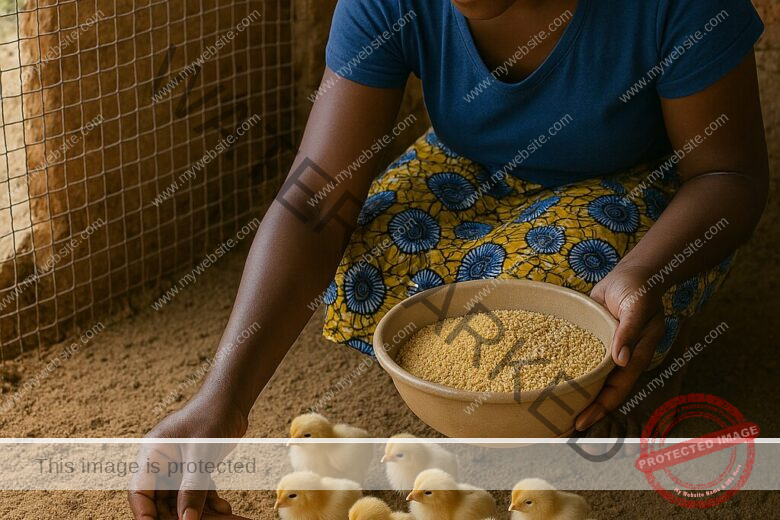Starting a poultry farming business in Kenya can be a rewarding and profitable venture. With a growing demand for poultry products, such as eggs and meat, there is a great opportunity for entrepreneurs to enter this industry.
Poultry farming offers several advantages, including low startup costs, high return on investment, and a relatively short production cycle.
However, it requires careful planning, knowledge of best practices, and effective management to ensure success.
This guide will provide you with valuable insights and step-by-step instructions on how to start and manage a poultry farming business in Kenya, enabling you to tap into the lucrative market and achieve your farming goals.
How To Start Poultry Farming Business In Kenya
We have carefully highlighted and discussed the steps involved in starting poultry farming business in Kenya. The steps include:
Step 1: Research and Planning
Before diving into poultry farming in Kenya, it’s crucial to conduct thorough research.
Explore the poultry industry to gain insights into market demand, consumer preferences, and existing competition.
Read Also: [Beginners Guide] How to Start Fish Farming on Small Scale
Analyze current trends, pricing, and distribution channels. Familiarize yourself with the regulatory framework and licensing requirements to ensure compliance.
With this information, develop a comprehensive business plan that outlines your objectives, financial projections, marketing strategies, and contingency plans.
A well-researched and robust business plan will guide your decisions and set a solid foundation for your poultry farming venture.
Step 2: Secure Suitable Land and Infrastructure
Once you have a clear plan, it’s time to find an appropriate location for your poultry farm. Look for land that offers convenient access to key resources like water and electricity.
Consider factors such as proximity to markets and availability of transportation routes. Assess the suitability of the land for poultry farming, ensuring it meets the necessary zoning regulations.
Construct or modify poultry houses to create a comfortable and safe environment for your birds.
Read Also: [Beginners Guide] How to Start a Small Animal Farm
Proper ventilation, adequate lighting, and effective waste management systems are essential to promote the well-being and productivity of your poultry.
Pay careful attention to sanitation facilities to maintain a hygienic environment that minimizes the risk of disease transmission.
Step 3: Choose the Poultry Production System
Once you have determined the type of poultry farming you want to engage in—broilers, layers, or both—it’s time to select the specific breed or hybrid that aligns with your goals.
Consider factors such as market demand, local preferences, productivity, and disease resistance. Consult with experts, fellow farmers, or agricultural extension services to gather insights and make an informed decision.
Read Also: How To Start Grasscutter Farming in Kenya
Remember that different breeds have varying requirements and performance levels, so choose the one that suits your production capacity and market dynamics.
Step 4: Procure Equipment and Supplies
To operate a successful poultry farming business in Kenya, you’ll need to procure essential equipment and supplies.
Invest in high-quality feeders, drinkers, incubators, heaters, and other necessary equipment based on your chosen production system.
These tools are crucial for creating a conducive and efficient environment for your poultry. Establish a reliable supply chain for quality feed, vaccines, medications, and bedding materials.
Connect with reputable suppliers, distributors, or local agricultural cooperatives to ensure a steady and timely provision of these inputs.
Proper equipment and a dependable supply chain will contribute to the overall health, growth, and productivity of your poultry.
Read Also: [Beginners Guide] How to Start Rabbit Farming in Kenya
Step 5: Establish Biosecurity Measures
Biosecurity is of utmost importance in poultry farming to safeguard the health and well-being of your flock.
Implement strict biosecurity protocols to minimize the risk of disease outbreaks. Control access to your farm by installing biosecurity barriers, such as fences or gates, to prevent unauthorized entry.
Practice good hygiene by regularly disinfecting equipment, poultry houses, and vehicles to reduce the spread of pathogens.
Implement a footbath system and require visitors and workers to wear appropriate protective clothing.
Quarantine new birds before introducing them to your existing flock to ensure they are disease-free.
Implement strict biosecurity measures to maintain a healthy environment for your poultry and protect your investment.
How To Raise A Kienyeji Chicken Farm In Kenya Video
Step 6: Obtain Necessary Permits and Licenses
Compliance with regulatory requirements is essential for operating a poultry farm in Kenya. Familiarize yourself with the specific permits, licenses, and certifications needed to legally establish and operate your poultry farm.
Contact local agricultural authorities or regulatory bodies to understand the specific requirements and procedures.
Obtain the necessary permits, such as business registration, environmental permits, and any other permits required by the relevant authorities.
Adhering to legal and regulatory obligations will ensure that your poultry farming business operates within the framework of the law and contributes to the sustainable development of the industry.
Step 7: Procure Day-Old Chicks or Hatching Eggs
To start your poultry farm in Kenya, you’ll need to procure day-old chicks or hatching eggs from reliable and reputable suppliers.
Choose suppliers who have a track record of providing healthy and disease-free poultry stock.
Inspect the quality of the chicks or eggs upon delivery to ensure they meet your expectations. Properly handle and transport the chicks or eggs to maintain their quality and health during transit.
Follow recommended temperature and handling guidelines to minimize stress and maximize the chances of successful hatching or rearing.
Step 8: Provide Proper Nutrition and Care
Proper nutrition is vital for the growth, health, and productivity of your poultry. Develop a feeding regimen that meets the specific nutritional requirements of your birds based on their age, breed, and production purpose.
Provide a balanced diet that includes essential nutrients such as proteins, carbohydrates, vitamins, and minerals.
Ensure a clean and adequate water supply at all times to keep your birds hydrated. Implement a vaccination schedule and work with a veterinarian to protect your flock from common poultry diseases.
Conduct regular health checks and promptly address any signs of illness or distress. By providing proper nutrition and care, you will maximize the growth, performance, and profitability of your poultry farm.
Step 9: Manage Poultry Health and Disease Control
Maintaining the health of your poultry is crucial for the success of your poultry farming business in Kenya.
Implement a comprehensive health management program to prevent and control diseases. Regularly monitor the health of your birds, observing their behavior, appetite, and overall appearance.
Establish a close working relationship with a poultry veterinarian who can provide guidance on disease prevention and treatment.
Develop and follow a vaccination schedule based on the specific diseases prevalent in your area.
Vaccinations play a key role in preventing common poultry diseases such as Newcastle disease, infectious bronchitis, and Marek’s disease.
Follow proper vaccination techniques and ensure that all birds receive the appropriate vaccines at the recommended ages.
Practice good biosecurity measures to minimize the risk of introducing diseases to your farm. Control access to your poultry farm, limit visitors, and maintain strict sanitation practices.
Quarantine new birds before introducing them to the existing flock to prevent the spread of diseases.
Step 10: Market and Sell Poultry Products
Identify your target markets and develop effective marketing strategies to promote your poultry products. Explore different sales channels, such as local markets, supermarkets, and direct sales, to reach potential customers.
Benefits of Starting Poultry Farming Business in Kenya
Starting a poultry farming business in Kenya offers several benefits, including:
- Profitability: Poultry farming can be a highly profitable venture in Kenya, with a consistent demand for poultry products such as eggs and chicken meat. By implementing efficient production and marketing strategies, farmers can generate a steady income and achieve good returns on investment.
- Job Creation: Poultry farming provides employment opportunities, both directly and indirectly. As a poultry farmer, you can create jobs for farm workers, technicians, and support staff, contributing to local economic development and reducing unemployment rates.
- Food Security: Poultry products, particularly eggs and chicken meat, are affordable and widely consumed sources of animal protein. By engaging in poultry farming, you contribute to improving food security in Kenya by producing nutritious and accessible food products.
- Diversification: Poultry farming allows for diversification of agricultural activities, especially for small-scale farmers. It can serve as an additional source of income alongside other farming enterprises, providing a more stable and diversified farming system.
- Small Land Requirement: Poultry farming requires relatively smaller land areas compared to other livestock ventures, making it suitable for farmers with limited land resources. It allows for efficient land utilization, enabling farmers to maximize production within a smaller space.
- Rapid Turnover and Shorter Production Cycle: Poultry farming has a shorter production cycle compared to other livestock ventures. Broilers can be ready for market within a few weeks, while layers start laying eggs at an early age. This rapid turnover allows for quicker returns on investment.
- Scalability: Poultry farming offers opportunities for scalability and expansion. As your business grows, you can increase the number of birds, expand production capacity, and diversify into value-added poultry products or processing.
- Access to Support Programs: The government and various agricultural organizations in Kenya provide support programs, training, and financial assistance to poultry farmers. These initiatives aim to enhance productivity, improve disease control, and promote sustainable poultry farming practices.
- Environmental Sustainability: Poultry farming can be practiced with a smaller environmental footprint compared to other livestock ventures. With proper waste management systems, efficient use of resources, and sustainable production practices, poultry farming can contribute to environmental sustainability.
- Entrepreneurial Opportunity: Poultry farming allows individuals to become self-employed and take control of their own business. It provides an avenue for entrepreneurship, where farmers can apply their skills, knowledge, and creativity to build a successful and independent business venture.
Top of Form
Is Poultry Farming Business Profitable
Poultry farming has the potential to be a highly profitable business venture in Kenya. The demand for poultry products such as eggs and chicken meat remains high, providing a steady market for farmers.
However, profitability depends on various factors such as market demand, production efficiency, cost management, and marketing strategies.
By implementing effective business practices and maintaining high-quality standards, poultry farmers can achieve profitability and sustainable growth.
Challenges Faced when Starting Poultry Farming Business in Kenya
Starting a poultry farming business in Kenya comes with its own set of challenges. Some common challenges include:
- Capital Investment: Setting up a poultry farm requires a significant initial investment in land, infrastructure, equipment, and stock. Securing adequate funding can be a challenge for aspiring farmers.
- Disease Management: Poultry diseases can cause significant losses if not properly managed. Farmers need to be vigilant in implementing biosecurity measures, vaccination programs, and disease monitoring to prevent and control outbreaks.
- Market Competition: The poultry industry in Kenya is competitive, and farmers need to differentiate their products and establish strong marketing strategies to capture market share.
- Feed Costs: Poultry feed accounts for a significant portion of production costs. Fluctuations in feed prices can impact profitability, and farmers need to explore cost-effective feed sourcing options.
- Seasonal Variations: Poultry farming can be influenced by seasonal factors such as temperature, rainfall, and disease prevalence, requiring farmers to adapt their management practices accordingly.
Factors to Consider when Starting Poultry Farming Business in Kenya
Before starting a poultry farming business in Kenya, it is essential to consider the following factors:
- Market Demand: Assess the local and regional demand for poultry products to ensure a ready market for your products.
- Location: Choose a suitable location that provides access to resources such as water, electricity, and transportation networks. Consider proximity to markets and potential customers.
- Financial Planning: Develop a comprehensive business plan that outlines your investment requirements, operational costs, and expected returns. Secure adequate funding or financing options.
- Farm Size and Scale: Determine the size and scale of your poultry farm based on available resources, market demand, and your production capacity.
- Farm Management Skills: Acquire the necessary knowledge and skills in poultry farming through training programs, workshops, or practical experience. Understand the technical aspects of poultry management, disease control, and nutrition.
Best Practices for Starting Poultry Farming Business in Kenya
To set a strong foundation for your poultry farming business in Kenya, consider the following best practices:
- Proper Planning: Conduct thorough research, develop a sound business plan, and establish clear goals and objectives.
- Biosecurity Measures: Implement strict biosecurity protocols to prevent the introduction and spread of diseases.
- Quality Stock: Source high-quality day-old chicks or hatching eggs from reputable suppliers to ensure healthy and productive birds.
- Good Nutrition: Provide balanced and nutritious feed to support optimal growth, productivity, and health of your poultry.
- Record Keeping: Maintain detailed records of expenses, production data, and health records to track performance and make informed business decisions.
Where to Sell Poultry Produce
There are several avenues to sell poultry produce in Kenya, including:
- Local Markets: Sell your poultry products directly to consumers at local markets, roadside stalls, or through home delivery services.
- Wholesalers and Retailers: Establish relationships with wholesalers and retailers who can distribute your products to a wider customer base.
- Hotels and Restaurants: Supply poultry products to hotels, restaurants, and catering businesses that have a consistent demand for poultry meat and eggs.
- Supermarkets and Grocery Stores: Approach supermarkets and grocery store chains to stock your poultry products on their shelves.
- Online Platforms: Utilize online marketplaces or social media platforms to reach a wider customer base and sell your poultry produce directly to consumers.
Best Practices of Starting Poultry Farming Business
To ensure success in your poultry farming business in Kenya, follow these best practices:
- Proper Housing and Ventilation: Provide well-designed poultry houses that offer adequate space, ventilation, and protection from harsh weather conditions.
- Hygiene and Sanitation: Maintain clean and sanitized facilities to prevent the spread of diseases and ensure the well-being of your birds.
- Disease Prevention and Control: Implement vaccination programs, regular health checks, and appropriate biosecurity measures to prevent and control diseases.
- Monitoring and Management: Regularly monitor the performance of your birds, including growth rates, feed conversion ratios, and egg production, to identify areas for improvement.
- Continuous Learning: Stay updated with the latest advancements in poultry farming practices, attend seminars or training programs, and network with other farmers to gain insights and knowledge.
Cost of Starting Poultry Farming Business in Kenya
The cost of starting a poultry farming business in Kenya can vary depending on various factors such as farm size, infrastructure requirements, breed selection, and equipment investments.
The major cost components include land acquisition or lease, construction or modification of poultry houses, purchase of day-old chicks or hatching eggs, feed and nutrition expenses, equipment and supplies, veterinary services, and marketing expenses.
Conduct a detailed financial analysis and budgeting to estimate the initial investment and ongoing operational costs for your specific poultry farming venture.
Poultry Farming In Kenya Kienyeji
Kienyeji poultry farming, also known as indigenous poultry farming, is a popular practice in Kenya. It involves raising local chicken breeds that are well-adapted to the local environment.
To start Kienyeji poultry farming, you need to select indigenous chicken breeds like Kuroiler, Kenbro, Rainbow Rooster, or KARI Improved Kienyeji.
Provide suitable housing with well-ventilated coops and enough space for the chickens to move around comfortably.
Feeding them a balanced diet consisting of grains, vegetables, insects, and supplements is crucial. Implement strict biosecurity measures to prevent diseases, vaccinate your chickens, and regularly monitor their health.
Breeding and hatchery management are essential for maintaining and improving the quality of your flock.
Marketing your Kienyeji poultry products and exploring value addition opportunities can help increase profitability.
Training, collaboration with other farmers, and staying updated on industry practices are key to running a successful Kienyeji poultry farming business in Kenya.
Poultry Farming For Beginners
Poultry farming is an ideal venture for beginners looking to enter the agricultural sector in Kenya.
To start a poultry farming business, it’s crucial to conduct thorough research and plan your operations carefully.
Familiarize yourself with the local poultry industry, including market demand and potential challenges.
Develop a comprehensive business plan that outlines your goals, budget, and production strategy.
Select suitable housing facilities that provide ample space, proper ventilation, and protection from predators.
Choose the right poultry breed, considering factors like growth rate, egg production, and disease resistance. Source healthy day-old chicks or quality hatching eggs from reliable suppliers.
Ensure proper nutrition by formulating a balanced diet and feeding schedule in consultation with a veterinarian or poultry nutritionist.
Implement strict biosecurity measures to prevent disease outbreaks, including controlled access, hygiene practices, and regular health monitoring.
Develop a marketing strategy to sell your poultry products to local markets, wholesalers, retailers, restaurants, or direct consumers.
Continuous learning and improvement are essential in poultry farming, so stay updated with the latest practices and seek guidance from experienced farmers.
Conclusion
Starting a poultry farming business in Kenya can be a lucrative venture with the right knowledge and planning. By following the step-by-step guide provided, you can embark on a successful journey in poultry farming. Remember to prioritize proper management, adhere to industry best practices, and stay updated on market trends to ensure a thriving and sustainable poultry business in Kenya.



